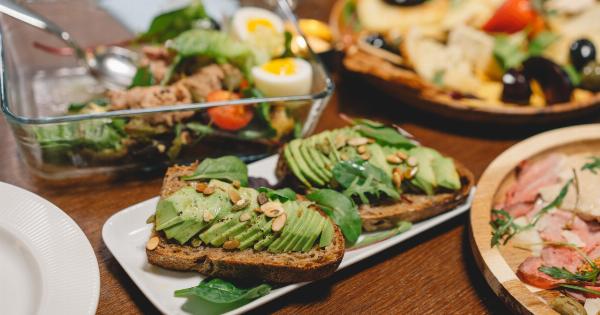We all have fears in our lives. Some of us may be afraid of public speaking, heights, or spiders. Others may have more complex fears such as fear of failure, fear of rejection, or fear of the unknown.
These fears can prevent us from taking risks, pursuing our dreams, and living the life we desire.
One of the ways people deal with their fears is by drinking alcohol. While alcohol may provide temporary relief, it is not a sustainable solution.
Drinking can actually make our fears worse because it impairs our judgment and can lead to reckless behavior.
However, there are certain drinks that can help us confront our fears in a bold and effective way. These drinks contain ingredients that can calm our nerves, boost our confidence, and help us take on whatever challenges we may face.
1. Chamomile Tea
Chamomile tea is a widely recognized natural remedy for anxiety and stress. This tea contains apigenin, a flavonoid that binds to receptors in the brain and promotes relaxation.
Chamomile tea can also reduce inflammation, boost the immune system, and aid digestion.
Drinking chamomile tea before a stressful event can help you feel calmer and more focused. It can also help you sleep better at night, which can further reduce your anxiety levels.
2. Ashwagandha Tea
Ashwagandha is an adaptogenic herb that has been used in Ayurvedic medicine for thousands of years. This herb is known to reduce stress and anxiety by balancing the levels of cortisol, a hormone that is produced in response to stress.
Ashwagandha tea can also boost your immune system, improve brain function, and increase endurance. It has a slightly bitter taste, but you can add honey or lemon to make it more palatable.
3. Kava Kava Tea
Kava kava is a tropical plant that is commonly used in traditional medicine in Polynesia and other Pacific islands. The root of the plant contains compounds called kavalactones, which have sedative and anxiolytic effects.
Kava kava tea can reduce anxiety, improve mood, and promote relaxation. It can also alleviate pain and inflammation, and enhance cognitive function. However, it should be consumed in moderation due to some risks involved.
4. Lemon Balm Tea
Lemon balm is an herb that belongs to the mint family. This herb has a citrusy aroma and flavor, and is known to have calming and uplifting effects on the mind and body.
Lemon balm tea can reduce anxiety, improve cognitive function, and promote better sleep. It can also relieve pain and discomfort caused by digestive issues. Drinking lemon balm tea regularly can help you feel more relaxed and optimistic in everyday life.
5. Passionflower Tea
Passionflower is a climbing vine that has been used in traditional medicine for centuries. This plant contains flavonoids and alkaloids that have sedative and anxiolytic effects.
Passionflower tea can reduce anxiety, improve sleep quality, and reduce inflammation. It can also alleviate pain and muscle spasms. Drinking passionflower tea can help you feel more calm and centered, and can improve your overall well-being.
6. Valerian Root Tea
Valerian root is an herb that has been used as a sleep aid and anxiety reducer for centuries. This root contains several compounds that interact with the nervous system to promote relaxation and reduce stress.
Valerian root tea can help you fall asleep faster, stay asleep longer, and wake up feeling refreshed. It can also reduce anxiety levels, improve mood, and reduce inflammation.
However, it should not be consumed in amounts larger than recommended, or for extended periods of time.
7. Lavender Tea
Lavender is an herb that is well-known for its calming and soothing effects. This herb contains several compounds, including linalool and linalyl acetate, that have sedative and anxiolytic properties.
Lavender tea can reduce anxiety, improve sleep quality, and promote relaxation. It can also alleviate pain, improve digestion, and boost the immune system.
Drinking lavender tea regularly can help you feel more relaxed and at ease in daily life situations.
8. Rhodiola Rosea Tea
Rhodiola rosea is an adaptogenic herb that has been used in traditional medicine for centuries. This herb is known to reduce stress and anxiety levels, increase energy and focus, and enhance physical performance.
Rhodiola rosea tea can help you manage stress better, improve cognitive function, and increase stamina. It can also reduce inflammation, improve heart health, and boost the immune system.
Drinking rhodiola rosea tea regularly can help you feel more resilient and confident in the face of challenges.
9. Tulsi Tea
Tulsi, also known as holy basil, is an herb that is widely used in Ayurvedic medicine for its numerous health benefits. This herb is known to reduce stress and anxiety, balance hormones, boost the immune system, and improve digestion.
Tulsi tea can help you feel more calm and centered, reduce inflammation, and promote detoxification. It can also improve asthma symptoms, reduce fever, and protect against infections.
Drinking tulsi tea regularly can help you feel more grounded and balanced in everyday life.
10. Lemon Water
Lemon water is a simple yet effective remedy for anxiety and stress. Lemons are high in vitamin C, which can reduce the levels of cortisol, a hormone that is produced in response to stress.
Drinking lemon water can improve digestion, boost the immune system, and promote hydration. It can also help you feel more alert and energized, and reduce inflammation throughout the body.
Drinking lemon water regularly can support overall health and well-being.
In conclusion, there are many natural drinks that can help you confront your fears and live a more confident and fulfilling life.
Whether you prefer tea, herbal infusions, or simple lemon water, there are options available that can support your goals and desires. Remember that drinking should not be a substitute for seeking professional help if your fears significantly affect your quality of life.





























